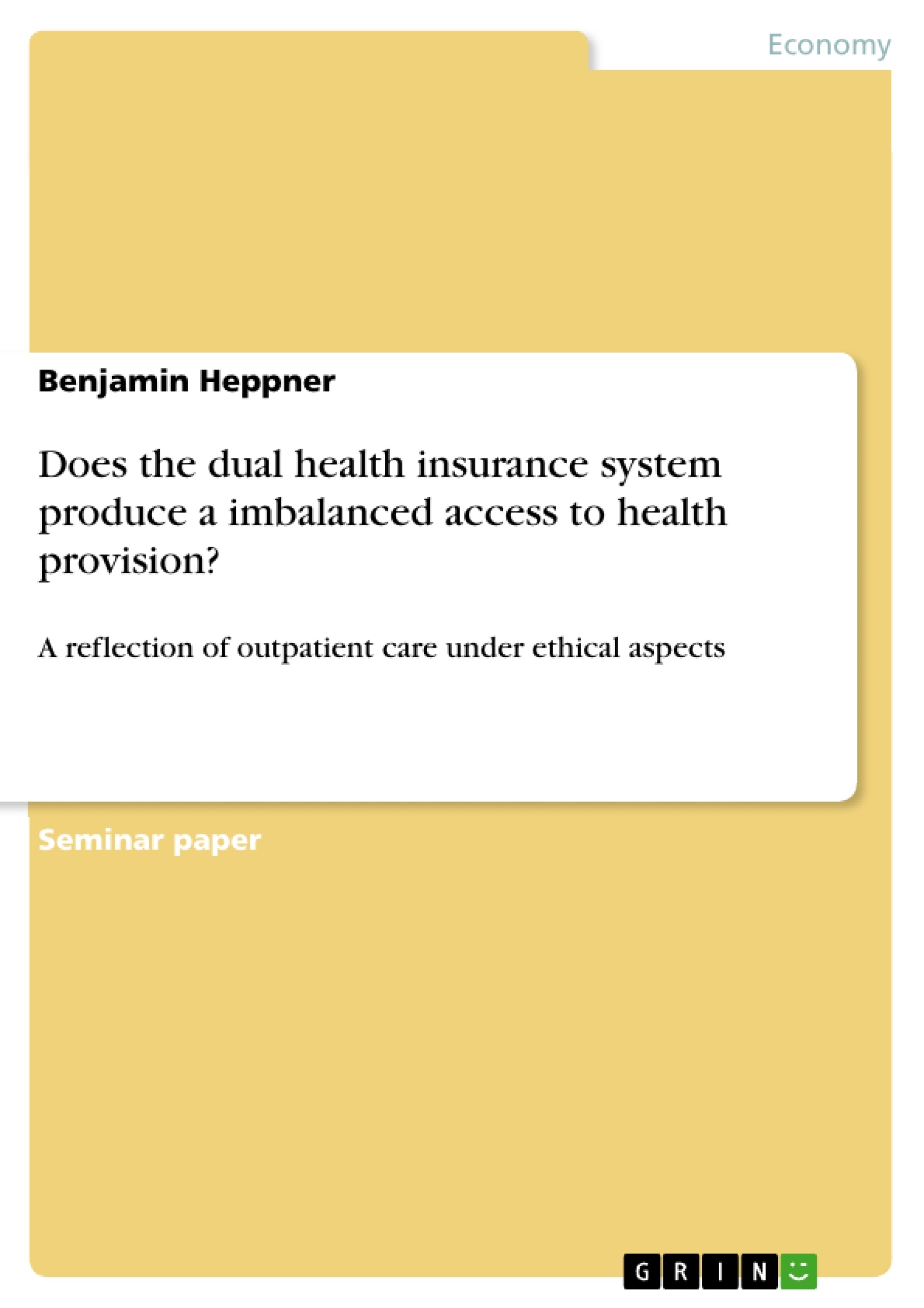This paper examines the effect of the dual health insurance on medical care in the outpatient sector, which stakeholder groups are still affected in addition to patients, and what the ethical outcome is. The dual health insurance system consists of statutory health insurance (SHI) and private full health insurance (PHI). About 72 million people in Germany are covered by one of the 110 statutory health insurances and around 9 million by the private sector. In 2016, a total of around 3565 billion euros were spent for healthcare. Outpatient treatment in doctors' practices accounted for 14.9% of this total.
Different research papers has shown, that the waiting time for a treatment is an indicator to measure imbalance access to health services. In two reports, different waiting times for SHI and PHI insured persons at a doctor's appointment could be determined. The length also depends on the distance to the end of the quarter, which is due to different rates paid to the doctors.
This unequal treatment was considered from an ethical point of view from the point of view of Utilitarianism and Kantianism. Both legitimize this procedure, but it must be questioned whether a fundamental change would not be more beneficial. However, the different access to health care does not represent a lower quality of medical treatment. Recent studies have shown that SHI insurants even receive the better benefits and that there is only a difference in service.
Inhaltsverzeichnis (Table of Contents)
- Introduction.
- Morals and Ethics
- Utility-based ethics by Bentham and Mill
- Kant's duty-based ethics
- The German health insurance system...
- Statutory health insurance vs. private health insurance...
- Different access for outpatient care...
- Conclusion
- References.
Zielsetzung und Themenschwerpunkte (Objectives and Key Themes)
This work explores the potential for imbalanced access to health provision within Germany's dual health insurance system, specifically focusing on outpatient care. The analysis examines whether the different insurance statuses of patients (statutory health insurance and private health insurance) lead to unequal treatment by healthcare providers, particularly in terms of waiting times and the quality of care. Ethical frameworks are employed to evaluate these potential disparities, specifically utilitarianism and Kantianism.
- The impact of Germany's dual health insurance system on access to outpatient care.
- The ethical considerations of unequal treatment based on insurance status.
- The application of utilitarianism and Kantianism to the analysis of health insurance disparities.
- The potential for a fundamental shift in the German health insurance system.
- The ongoing debate surrounding fair and equal treatment in the healthcare sector.
Zusammenfassung der Kapitel (Chapter Summaries)
The introduction sets the stage by outlining the unique dual health insurance system in Germany, highlighting the contrasting experiences of statutory health insurance (SHI) and private health insurance (PHI) patients. The text explores the increasing demand for a citizens' insurance model as a potential solution to perceived inequalities in access to healthcare.
The chapter "Morals and Ethics" defines the concepts of morality and ethics, distinguishing them from one another. It then introduces two prominent ethical viewpoints: utilitarianism and Kant's categorical imperative, setting the groundwork for the ethical analysis that follows.
The subsequent chapter delves into the German health insurance system, outlining the differences between SHI and PHI. This section serves as a foundation for exploring the potential disparities in access to health provision based on insurance status.
Schlüsselwörter (Keywords)
The main keywords and focus topics of this work include health insurance systems, outpatient care, utilitarianism, Kantianism, ethics, and disparities in healthcare access. It examines the ethical implications of potential imbalances in treatment related to insurance status, with particular attention to the German healthcare context.
Frequently Asked Questions
Does Germany's dual health insurance system cause inequality?
The paper investigates if the split between statutory (SHI) and private (PHI) insurance leads to imbalanced access, particularly regarding waiting times for doctor appointments.
How do waiting times differ between SHI and PHI patients?
Studies show that PHI patients often receive faster appointments, partly because doctors receive higher reimbursement rates for treating privately insured individuals.
Is the quality of medical treatment lower for statutory insured patients?
Recent research suggests that while there is a difference in service and speed, SHI patients often receive the same or even better medical benefits in terms of evidence-based care.
What ethical frameworks are used to analyze this issue?
The paper uses Utilitarianism (Bentham/Mill) and Kantianism to evaluate whether the dual system is ethically justifiable or if a "citizens' insurance" would be better.
What are the stakeholders affected by this system?
Beyond patients, the system affects doctors (incomes), insurance companies, and the general public through the distribution of healthcare resources.
- Quote paper
- Benjamin Heppner (Author), 2019, Does the dual health insurance system produce a imbalanced access to health provision?, Munich, GRIN Verlag, https://www.grin.com/document/480595



